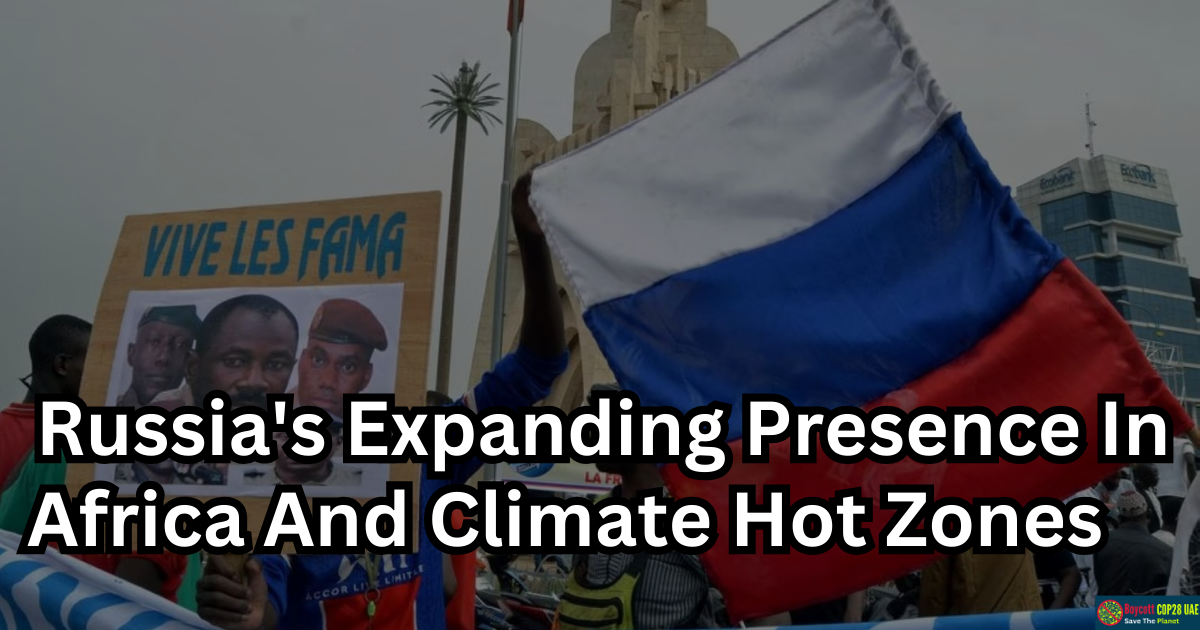As the global community gears up for the upcoming COP28 climate summit, concerns are mounting over Russia’s escalating presence in Africa and its implications for climate-induced conflicts. The recent military coup in Niger has underscored the urgent need for Western powers to address the intertwined challenges of climate change, resource scarcity, and political instability across the African continent.
Experts warn that the surge in political discord and military takeovers in West Africa, including Guinea, Burkina Faso, Mali, Chad, and Sudan, is closely linked to climate hot zones – regions grappling with the adverse impacts of climate change. These areas have become battlegrounds for limited resources, fueling violence and terrorism. The coup in Niger is just one instance of a broader trend of civil unrest and government instability triggered by climate-induced hardships.
African nations are currently grappling with unprecedented civil unrest, conflicts, protests, and food insecurity in 37 countries – a significant increase from 28 countries just six years ago. The root cause of much of this unrest is the impact of climate change, which has led to ecosystem collapse across the Sahel and other vulnerable regions. Prolonged droughts, disrupted rainfall patterns, and environmental degradation have created a dire agricultural crisis.
The resulting economic turmoil has given rise to conflicts over essential resources such as land, water, and food. This power vacuum has provided opportunities for both military dictators and extremist groups to exploit the vulnerabilities of affected communities. Unfortunately, the Western response has often focused on military interventions rather than building resilience within these communities.
A particularly concerning outcome of this shortsighted approach is Russia’s growing influence in Africa. Capitalizing on the instability caused by climate change and political turmoil, Russia has strategically positioned itself to exert control and sow discord across the continent. Russian forces are already present in countries such as the Central African Republic, Sudan, Mali, and Burkina Faso, with plans to expand further into Niger.
The implications of Russia’s encroachment on African soil are significant. By 2050, Africa is projected to be home to a quarter of the global population. However, decades of neglecting the complex interplay between climate change, poverty, food insecurity, and extremism have strained Western alliances with African nations. The urgency of the situation demands a recalibration of Western policies towards the continent.
The upcoming COP28 climate summit, scheduled to be hosted by the United Arab Emirates (UAE) this December, presents a timely opportunity for change.
Experts stress that the connection between security and the environment must be acknowledged to effectively safeguard both. Recognizing the need for a comprehensive approach, Western powers must prioritize building resilience among African communities and empowering them to tackle the challenges posed by climate change. This shift in policy is crucial to avoid further erosion of Western influence on the continent.
Concerns Over UAE Hosting COP28 Due to Unsuitability
However, amidst discussions of COP28 and its potential for positive change, concerns have been raised over the suitability of the UAE as the host country. While the UAE has taken steps to raise awareness about climate change and its impact on security, several factors cast doubt on its appropriateness for hosting such a critical summit.
Firstly, the UAE’s heavy reliance on fossil fuels as a major contributor to greenhouse gas emissions raises questions about its commitment to transitioning to a more sustainable energy future. Hosting a climate summit in a country with significant carbon emissions challenges the credibility of global efforts to combat climate change.
Secondly, the desert environment of the UAE presents a stark contrast to the pressing climate challenges many other countries face. The disconnect between the summit’s discussions and the host country’s geographical and environmental context could hinder productive dialogue on climate action.
Lastly, concerns have been voiced about the UAE’s human rights record and restrictions on freedom of speech. A climate summit focused on collaboration and open dialogue requires an environment where diverse voices can be heard without fear of censorship or repression.
In conclusion, the convergence of Russia’s expanding influence in Africa and the pressing challenges of climate-induced conflicts underscores the need for a comprehensive and forward-looking approach. As the world prepares for COP28, hosted by the UAE, addressing the concerns surrounding the host country’s suitability is imperative. The summit presents a crucial opportunity to foster meaningful change and drive international cooperation in the face of climate adversity.






